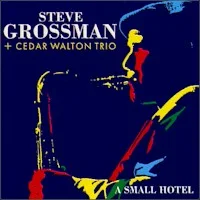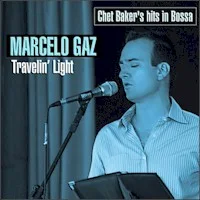Time: 42:30
Size: 97.3 MB
Styles: Bop, Saxophone jazz
Year: 1964/2007
Art: Front
[7:42] 1. A Lunar Tune
[4:49] 2. Cry Me Not
[7:55] 3. Grants Stand
[9:26] 4. A Day To Mourn
[9:45] 5. Al's In
[2:50] 6. Stella By Starlight
Bass – Richard Davis; Drums – Alan Dawson; Piano – Jaki Byard; Tenor Saxophone – Booker Ervin. Recorded at Van Gelder Studio, Englewood Cliffs, NJ; December 3, 1963.
In some ways tenor saxophonist Booker Ervin was the archetypal jazz player for the post-bop 1960s, combining the tradition of Texas sax with just the hint of edgy modernism, a sort of the Delta-meets-Morocco sound so accessible that it is easy to miss the chances Ervin took with his music. Although his career was short (cancer claimed him in the summer of 1970 when he was just shy of his 40th birthday), Ervin still managed to record some 20 albums as a frontman, most notably his "book" series, The Song Book, The Blues Book, The Space Book, and this fine session, The Freedom Book, which finds him working with a rhythm section of Jaki Byard on piano, Richard Davis on bass, and Alan Dawson on drums. Recorded on December 3, 1963, The Freedom Book is a near perfect set of modern hard bop, ranging just far enough out there to feel fresh but retaining a strong lifeline to bop tradition. Highlights of the session include an impressive Ervin original, "A Lunar Tune," a fine version of Randy Weston's "Cry Me Not," the deliberately strident "Al's In," and another Ervin composition, the moving "A Day to Mourn," an emotionally charged ballad written after the assassination of JFK.ballad written after the assassination of JFK. [A bonus track, an interesting and brief treatment of Victor Young's "Stella by Starlight," a piece strongly associated with Charlie Parker, that was recorded at the Freedom Book session but originally released on the album Groovin' High, is included on the 2007 edition, further capping off a wonderful album.] ~Steve Leggett
In some ways tenor saxophonist Booker Ervin was the archetypal jazz player for the post-bop 1960s, combining the tradition of Texas sax with just the hint of edgy modernism, a sort of the Delta-meets-Morocco sound so accessible that it is easy to miss the chances Ervin took with his music. Although his career was short (cancer claimed him in the summer of 1970 when he was just shy of his 40th birthday), Ervin still managed to record some 20 albums as a frontman, most notably his "book" series, The Song Book, The Blues Book, The Space Book, and this fine session, The Freedom Book, which finds him working with a rhythm section of Jaki Byard on piano, Richard Davis on bass, and Alan Dawson on drums. Recorded on December 3, 1963, The Freedom Book is a near perfect set of modern hard bop, ranging just far enough out there to feel fresh but retaining a strong lifeline to bop tradition. Highlights of the session include an impressive Ervin original, "A Lunar Tune," a fine version of Randy Weston's "Cry Me Not," the deliberately strident "Al's In," and another Ervin composition, the moving "A Day to Mourn," an emotionally charged ballad written after the assassination of JFK.ballad written after the assassination of JFK. [A bonus track, an interesting and brief treatment of Victor Young's "Stella by Starlight," a piece strongly associated with Charlie Parker, that was recorded at the Freedom Book session but originally released on the album Groovin' High, is included on the 2007 edition, further capping off a wonderful album.] ~Steve Leggett
The Freedom Book










